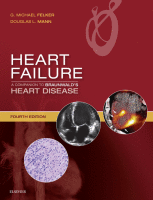Physical Address
304 North Cardinal St.
Dorchester Center, MA 02124

Existing therapies slow, but rarely reverse, heart failure disease progression. As a result, the prevalence of symptomatic heart failure has increased, as has the length of time that people spend in later stages of the disease. At the far end…

Due to the prevalence and major morbidity of heart failure (HF), as well as its associated public health burden with regard to total health care expenditures, HF serves as one of the top conditions targeted for quality of care improvement.…

Patients with heart failure (HF) often have multiple comorbid conditions that may interact with the syndrome of HF and/or the choice of therapies. Research into the common comorbid conditions has furthered the understanding of the pathophysiologic basis for symptoms or…

Heart failure (HF) currently affects more than 5 million Americans, and because of the aging population and the expected growth of the US population, the prevalence of HF is expected to increase to more than 8 million Americans by 2030…

Heart failure (HF) as a consequence of cancer treatment is a well-known clinical challenge with a history as old as the earliest days of cytotoxic chemotherapies and radiation-based treatment. During the past several decades of advancement in cancer treatment with…

Management of advanced heart failure is often less evidence-based than earlier stages of the disease. By definition, these patients are typically failing evidence-based medical and electrical heart failure therapies, so there are few clinical trials to guide therapy. Professional societies…

The first human heart transplant (HT) was performed more than 50 years ago, in 1967, by Christiaan Barnard at Groote Schuur Hospital in Cape Town, South Africa. Since that time over 100,000 lives have been saved by this procedure. Despite…

Pulmonary Hypertension: Definition and Classification Pulmonary hypertension (PH) is a hemodynamic finding and is considered to be present when the mean pulmonary artery pressure (mPAP) is greater than 20 mm Hg as recently defined by the Sixth World Symposium on…

The autonomic nervous system (ANS) plays a vital role in the management of cardiac function. The subdivisions of the ANS are the parasympathetic nervous system (PNS) and the sympathetic nervous system (SNS; see also Chapter 13 ). The SNS is…

Cardiac Cell Therapy Myocardial infarction (MI), despite significant advances in acute reperfusion and chronic pharmacotherapy, remains a major cause of heart failure in the United States. The lost myocardium is replaced by fibrotic scar leading to progressive left ventricular (LV)…